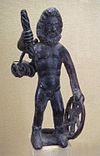- Cocidius
-
In Romano-British religion, Cocidius was a deity worshipped in northern Britain. The Romans equated him with Mars, god of war and hunting and with Sylvanus, god of forests, groves and wild fields. Like Belatu-Cadros, he was probably worshipped by lower-ranked Roman soldiers as well as Britons.
Contents
Etymology
Rivet and Smith, the authors of Place Names of Roman Britain, note that the name may be related to British Celtic cocco-, 'red', suggesting that statues of the god might have been painted red. However, this could simply be a Latinised version of Old Welsh coit (Modern Welsh coed), "woods" or "forest", making it a translation of Sylvanus, whose name also literally means god of the woods[citation needed]
Representations and dedications
Fanum Cocidius, meaning the temple of Cocidius, was a Roman place-name for a location close to the Solway Estuary. There are dedications to him around Hadrian's Wall and Cumbria, including the forts at Birdoswald and Bewcastle. Another inscription, at Ebchester, specifically refers to him as Cocidius Vernostonus, Cocidius of the alder tree. A 2000-year-old carving of Cocidius was recently found near Chesters Fort on Hadrian's Wall. This was dubbed the little man and shows a figure with its arms flung wide and legs braced firmly against the ground. Although the gender is not depicted, the shape and accessories are seemingly male, with a shield in the left hand, a sword in the right, and a scabbard hanging from the belt around his tunic. This is one of at least nine representations known in the Hadrian's Wall corridor, and a further 25 or so inscriptions dedicated to him. Most of these are along the western portion of the Wall, the most spectacular being found at Yardhope, where a figure in bas-relief brandishes spear and shield on a vertical rock-face at the entrance to a small shrine.[1]
References
- ^ Barnett, T. (2006). Gods on the Rocks. Current Archaeology 204: 618.
External links
Celtic mythology series Supra-regional Alaunus • Alisanos • Andarta • Anextiomarus • Artio • Aveta • Belenus • Belisama • Borvo • Brigantia • Camulus • Cernunnos • Cicolluis • Cissonius • Condatis • Damona • Matrona • Dis Pater • Epona • Erecura • Esus • Genii Cucullati • Grannus • Ialonus Contrebis • Lenus • Litavis • Loucetios • Lugus • Maponos • Matres • Mogons • Nantosuelta • Ogmios • Rosmerta • Segomo • Sirona • Sucellus • Suleviae • Taranis • Toutatis • Virotutis • VisuciusBritannia Gallia Aquitania Gallia Belgica Abnoba • Ancamna • Arduinna • Arvernus • Icovellauna • Inciona • Intarabus • Iovantucarus • Ritona • Veraudunus • Vindonnus • Vosegus • XulsigiaeGallia Celtica Gallia Cisalpina Gallia Narbonensis Germania Inferior Gallaecia Categories:- Celtic mythology stubs
- Ancient Gaulish and British gods
- War gods
- Hunting gods
- Nature gods
- Horned deities
Wikimedia Foundation. 2010.


